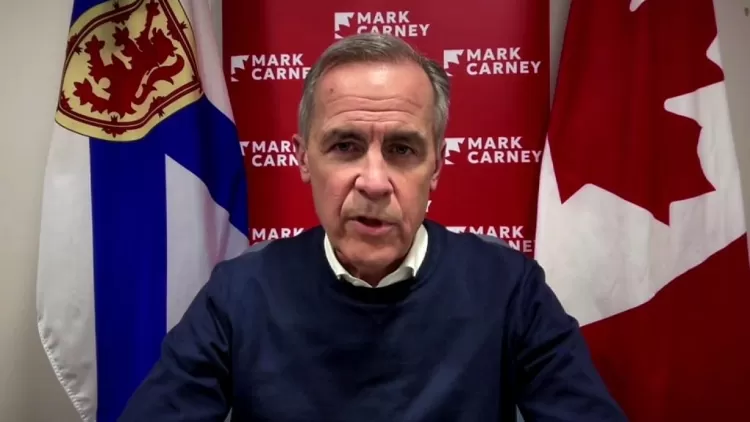Mark Carney Reacts to U.S. Tariffs and Discusses Canada's Response: A Crucial Moment for Global Trade
In a recent interview, Mark Carney, former Governor of the Bank of England and a candidate for Prime Minister of Canada, expressed strong views on the U.S. government's decision to impose 25% tariffs on Canadian imports. Carney's reaction underscores the tension between Canada and the United States and highlights the potential ramifications for global trade, especially in the wake of rising protectionism and trade wars.

Carney's Defiant Stand Against U.S. Tariffs
When asked about the White House's confirmation of the 25% tariffs, Carney was quick to respond, rejecting the idea that Canada would yield to pressure from the U.S. He emphasized that Canada would not "cave in" and would instead stand up to the U.S., which he referred to as acting like a bully. Despite the negative economic impacts that could arise from such a decision, Carney reaffirmed Canada's unwavering resolve in the face of these measures.
"We are going to stand up to a bully. We are united, and we will retaliate," Carney stated. He also highlighted that these tariffs would have a backlash effect on the U.S., harming both U.S. growth and reputation globally. According to Carney, these policies would ultimately increase inflation, raise interest rates, and damage the U.S.'s international standing.
The U.S.-Canada Trade Agreement Violation
Carney did not mince words when discussing the US-Mexico-Canada Agreement (USMCA)—the modern version of the historic NAFTA deal. He called the U.S. action a violation of the trade agreement, noting that it marks the second time in less than a decade that the U.S. has effectively ripped up a trade deal with its closest ally.
"The U.S. is violating the trade agreement," Carney stated, making it clear that this was not just a minor diplomatic dispute but a breach of trust and respect between the two nations. He also pointed out that the U.S. justified the tariffs by referencing issues such as illegal immigration and the trafficking of fentanyl. However, Carney stressed that Canada’s role in both of these issues is minimal, with less than 1% of illegal drugs and legal immigrants crossing from Canada compared to Mexico.
Canada’s Response: Retaliation and Strategic Measures
Carney outlined Canada’s response to the tariffs, emphasizing a strategic and measured approach. Although Carney refrained from disclosing specific retaliatory actions, he highlighted that Canada would match the U.S. tariffs dollar-for-dollar and target goods that would hit U.S. interests the hardest while minimizing the impact on Canadian businesses.
"I think it's reasonable to expect in the immediate term that we will match dollar for dollar the U.S. tariffs," Carney stated. He also suggested that Canada should target strategic sectors, such as Tesla and energy imports, particularly oil and potash, as a means of retaliating against those directly involved in the decisions that led to these tariffs.
Carney’s Vision for Canada’s Economic Future
Carney also shared his vision for Canada's economic future, particularly if he were to become Prime Minister. He expressed confidence in Canada’s strong economic resources and strategic importance on the world stage.
“We have tremendous resources in the country,” Carney said, reinforcing his belief that Canada has everything needed to thrive in a shifting global economy. He acknowledged that the trade actions from the U.S. present a significant challenge, but he viewed it as an opportunity for Canada to diversify its economic relationships with other like-minded nations, particularly in the European Union (EU) and the United Kingdom (UK).
Carney’s Call for International Solidarity
Carney highlighted that, in the face of U.S. protectionism, Canada’s natural allies are countries that share common values on trade and environmental sustainability. Carney mentioned the UK, EU, and other G7 nations as key partners who might align with Canada’s efforts to resist U.S. trade tactics and advocate for sustainable practices.
He urged these countries to view the current U.S. actions as a precursor for what could come next, stating that protectionism and unilateral trade actions could expand, creating significant risks for global markets. Carney also pointed to climate policy as a potential area where Canada could align with like-minded nations, emphasizing that countries like the UK and EU are already making significant strides to address climate change and could work together to protect the trade competitiveness of companies that prioritize sustainability.
Looking Ahead: The Future of Global Trade Relations
Carney’s remarks underscore the growing importance of multilateral cooperation in the face of rising protectionism. As the U.S. turns inward with its tariffs and trade barriers, Carney sees a clear opportunity for Canada and other like-minded countries to push back by strengthening their economic relationships and finding alternative avenues for trade.
While he didn’t make any sweeping predictions, Carney’s words suggest that the G7 countries may eventually coordinate responses to the U.S.’s trade tactics. One possibility he hinted at is a carbon border tax, a coordinated measure that would help protect the clean economy initiatives of countries like Canada, especially as the U.S. moves away from such initiatives.
Mark Carney’s Reflection on Brexit and Economic Impact
In addition to his comments on U.S.-Canada trade relations, Carney also reflected on the economic impact of Brexit. Carney, who had been vocal in the past about his concerns regarding Brexit’s long-term economic consequences for the UK, expressed regret that the UK is now facing the negative effects of that decision. While the UK is still grappling with the outcomes of Brexit, Carney noted that Canada’s economic strategy could act as a countermeasure to protect its interests and position itself for growth in a new global economic environment.
Conclusion
Mark Carney’s comments provide a strong defense of Canada’s position in the face of the U.S. trade tariffs, showcasing the resilience and determination of Canada to stand firm against what he described as unjustified actions.
Whether or not Carney becomes Prime Minister, his message is clear: Canada will not back down in the face of economic pressures from the U.S. Instead, it will look to its allies and leverage its strategic resources to foster global partnerships that prioritize sustainable trade, environmental responsibility, and multilateral cooperation.
What's Your Reaction?















